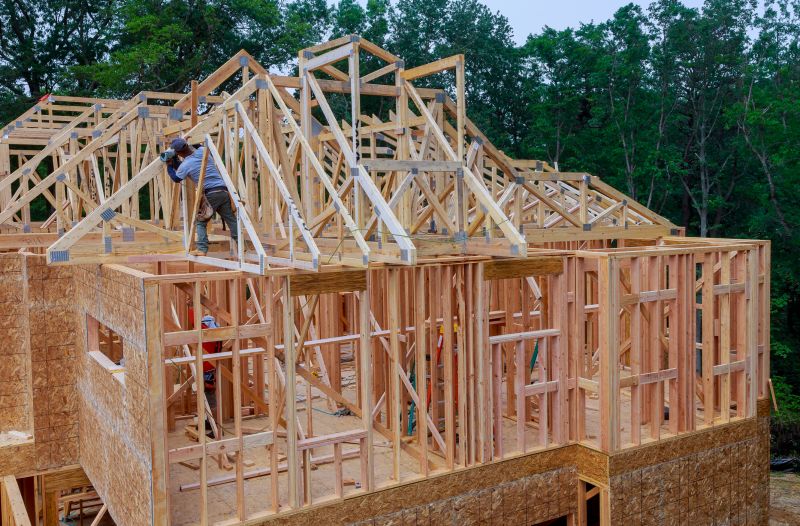Popular Roof Framing Products For Professional-Grade Construction
Discover the most trusted products that help create strong, stable, and long-lasting roof structures for various building needs.
 Roof framing products are essential components in the construction and renovation of roofing structures. They provide the foundational support needed to ensure stability, durability, and proper load distribution for various types of roofs. Selecting the right products involves understanding the different materials, sizes, and design options available to match specific project requirements. From traditional wood trusses to modern metal framing systems, the variety of options allows builders and homeowners to customize their roofing solutions effectively.
Roof framing products are essential components in the construction and renovation of roofing structures. They provide the foundational support needed to ensure stability, durability, and proper load distribution for various types of roofs. Selecting the right products involves understanding the different materials, sizes, and design options available to match specific project requirements. From traditional wood trusses to modern metal framing systems, the variety of options allows builders and homeowners to customize their roofing solutions effectively.
Top Overall Option
Structural Wood Trusses
Structural wood trusses are widely used in roof framing due to their versatility and ease of installation. They are engineered components designed to distribute loads efficiently across the roof span, providing a stable framework for various roof shapes and designs. These trusses can be customized to fit specific architectural requirements and are compatible with different roofing materials. Their predictable performance and availability in various sizes make them a popular choice for both residential and commercial projects.
Types of Products For Roof Framings
Wooden Roof Trusses
Engineered wooden trusses designed for quick assembly and reliable support in diverse roofing applications.
Metal Roof Trusses
Steel or aluminum trusses offering high strength and resistance to pests and environmental factors.
Laminated Veneer Lumber (LVL)
Engineered wood product providing high strength and stability for roof framing components.
Open Web Steel Joists
Lightweight steel framing members designed for long spans and load-bearing support.
Plywood Sheathing
Structural plywood panels used to reinforce roof decks and provide a base for roofing materials.
Engineered I-Beams
Pre-fabricated steel or wood I-beams offering high load capacity for large spans.
Roof Framing Connectors
Metal brackets and plates used to join structural elements securely.
Roof Truss Kits
Pre-packaged sets including all components needed for constructing roof trusses.
Hip and Valley Rafters
Specialized framing components designed for complex roof geometries.
Roof Ridge Beams
Horizontal beams supporting the peak of the roof structure.
Purlins
Horizontal structural members supporting roof decking or sheathing.
Bridging and Blocking
Additional framing elements used to reinforce and stabilize roof structures.
Roof Decking Boards
Solid or tongue-and-groove boards providing a base for roofing materials.
Insulated Roof Panels
Pre-fabricated panels combining insulation with structural support.
Lightweight Framing Materials
Materials designed to reduce overall weight without compromising strength.
Popular Choices
Commonly used for their ease of installation and adaptability across various projects.
Chosen for their durability and resistance to pests and decay in many applications.
Popular for their consistent quality and high load capacity in large spans.
Favored for their lightweight yet strong support in commercial and residential structures.
Widely used for creating a solid base for roofing materials and adding structural stability.
Popular for simplifying the construction process with all components included.
Commonly selected for supporting roof decks and creating complex roof geometries.
Frequently used to support the peak of the roof in various architectural designs.
Increasingly popular for their combined structural and insulation properties.
Chosen for projects requiring reduced overall weight without sacrificing strength.
Proper roof framing not only supports the weight of roofing materials but also contributes to the overall integrity of the building. It must withstand environmental factors such as wind, snow, and rain, making material choice and construction quality crucial. Additionally, compatibility with other structural elements and ease of installation are important considerations. Whether constructing a new roof or upgrading an existing one, choosing the appropriate framing products can significantly influence the longevity and safety of the structure.
Advancements in framing technology have introduced innovative materials and design techniques, offering improved strength-to-weight ratios and ease of assembly. Metal framing systems, for example, are known for their resistance to pests and rot, while engineered wood products can provide consistent quality and strength. When selecting products for roof framing, it is vital to consider local building codes and load requirements, ensuring compliance and safety. Proper planning and product selection are key steps toward achieving a reliable and efficient roofing system that meets the specific needs of each project.
Key Buying Considerations
- Material durability and resistance to pests, rot, and environmental factors.
- Load capacity and span length to ensure structural stability.
- Compatibility with existing building components and roofing materials.
- Ease of installation and availability of pre-fabricated options.
- Compliance with local building codes and safety standards.
- Weight of the framing products and their impact on overall structure.
- Cost-effectiveness and long-term maintenance requirements.
- Flexibility in design for complex or custom roof shapes.
- Availability of accessories and connectors for secure assembly.
- Environmental conditions in your area that may influence material choice.
- Certification and quality assurance from manufacturers.
- Compatibility with insulation and ventilation systems.
- Potential for future modifications or expansions.
- Reputation and reliability of suppliers or manufacturers.
- Warranty or support options available for the products.
